To WEAR A POPPY
To WEAR A POPPY
When we buy a poppy, approaching Remembrance Day
There’s a method we should sport it - in a special way
Don’t show it off too early - as politicians do
Or have it on your right side - that is quite
wrong too
Place it on your left side so others will not mock
Make sure the leaf that’s with it - is eleven of the clock
I reckon it’s noteworthy to pin it on correct.
When donning this fine emblem, expressing your respect.
Of course it’s not compulsory but that’s the way I see
One reason why you’re wearing it - is because we’re free!
MY DAD`S WAR
MY DAD`S WAR
My Father Frank Earl was born in 1895 -
When the first world war broke out - with the patriotic fervor at that time, Frank joined as a volunteer and then commissioned as 2nd. Lieut. On 28th. Nov. 1914
On 10th Sept. he
enlisted at Sheffield Corn Exchange with the Sheffield City battalion - the 12th B. York and Lancaster Regiment, consisting of University and commercial men as well as men from all walks of life. Between 900 and 1,000 men were recruited in 2 days.
In
December the battalion went to train at Redmires camp, west of the city for 5 months. Training then followed at Penkridge Bank camp nr Rugeley, Ripon,and Hurdcott Camp near Salisbury throughout 1915.On 20th Dec.the battalion left for Alexandria Egypt on HMT
NESTOR as part of the 94th Brigade.( 31st division)
They had been assigned to defend the Suez Canal, but threats of an attack by the Turkish army diminished, and the Division was sent to the Somme. On 10th March 1916 they embarked on the crowded ship
H.M.T. BRITON at Port Said, other ships were torpedoed nearby but they reached Marseilles on 15th.March. They then had a 15 hour train journey and a 12 mile route march to Pont Remy near Huppy. 18 days later the battalion took over a stretch of the front line
opposite the hill-top village of Serre. The Sheffield City Battalion were at the extreme left of a 15 mile front defended by the British, stretching south from Serre to Maricourt.
On Saturday 24th June, the British artillery opened a bombardment that
over a 5-day period was intended to destroy the German defenses completely. Each night the battalion sent out raiding and wire-examining parties; ominously, the German wire was found to be incompletely cut. On 28th June, word was received that the attack would
be postponed for two days because of the poor weather. The new time for the start of the offensive was 7.30am on Saturday 1st July.
At 3.45am on 1st July, the battalion was in position in the assembly trenches, finding them already in an atrocious condition
from German shellfire. Patrols from the 4th and 7th Companies of the 169th (8th Baden) Infantry Regiment defending Serre noted the build-up. With the appearance of daylight at 4.05am, German artillery began to shell the British front line.
At 7.20am the
first wave of the battalion moved 100yds into No Man's Land and lay flat on the ground as the brigade mortar battery and divisional artillery placed a final hurricane bombardment over the German front line. A few minutes later - with the British front line
coming under an intense counter-barrage - the second wave took up position 30yds behind the first.
At 7.30am the bombardment lifted from the German front line. All four waves rose, took a moment to align themselves, then advanced steadily towards the
German lines into a devastating hail of machine gun bullets and shellfire. An ineffective smoke screen exposed the battalion to machine gun fire from the left as well as from ahead. The third and fourth waves, caught on the opposite side of the valley, were
reduced to half strength before even reaching No Man's Land. On the left of the battalion front, long stretches of barbed wire had been left uncut. Men brought to a halt in front of the impenetrable entanglements were reduced to firing vainly through the wire
to the German lines beyond. Some managed to return to the British lines. Others were never heard of again. Within minutes it was as if the battalion had been wiped off the face of the earth... The battle for Serre was lost.
My Father was shot in the
first wave at 0730 He lay out in no man’s land with all the shelling and machine gun fire. Within minutes only remnants of the battalion were left, and were taken out of the line on July 3rd, having lost 513 officers and men killed, wounded or missing,
and a further 75 slightly wounded.
Of 36 Officers and 747 other ranks that went over the top that morning, 18 officers and 495 other ranks were casualties – out of the 248 officers and men killed 165 were never identified.
Throughout the Battle
of the Somme, Serre was never captured, falling into British hands only in 1917.
After the war Sheffield placed a memorial in the village of Serre to the men of the City Battalion who had fallen in the attack of July 1st 1916.
My Father, Lieut. Francis Campion Earl, ( age 21) was wounded, (he was a bomb thrower) lying out in No Man's Land for several hours until dusk. He had severe injuries caused by shrapnel in his chest and a bullet wound in his abdomen. He took a lot of aspirin, and a cat came and sat on his stomach whilst he was lying there, keeping him warm. He was rescued - with others -by his Sgt. Major and a group of men, and sent back for treatment for peritonitis, and a damaged kidney (which had to be removed.) and liver, and later developed an abscess in the right groin. He was evacuated to a little hut where first aid was carried out and then to a big house for further attention, he was then evacuated to a hospital at Le Treport, where his mother and brother were sent for, as he was so dangerously ill. He was incapacitated for military duty for 4 months. He left Le Havre on 6th august 1916 on the ASTURIAS, arriving at Southampton on 8th August 1916 and travelling to 2nd Western General Hospital, Manchester. He joined the 3rd Bn Yorks and Lancs on 2nd Nov. 1916.He was appointed Temp. Captain while Adjutant of a Volunteer Bn in 1917. His wounds caused problems for him and he eventually relinquished his commission on completion of service from 27th Jan 1920, being granted rank of Captain.
When the
2nd world war was declared the Local Defense Volunteers were soon formed.
Dad organized the local villagers and they used to drill with sticks on the lawn. He was made Company Commander of `B` Company 2nd. Bn. Sherwood Foresters Home Guard responsible
for the area Retford to the Trent at Dunham Bridge.
They were fairly well trained and even captured a German airplane pilot who had bailed out.
My Father died in January 1946 at the age of 51 he had 7 children – I was the youngest but one and only four and a half years old when he died.
OUR SOLDIERS
OUR SOLDIERS
You wear the Kevlar helmet when going on patrol
Code signs on the flap sheet when Warriors start to roll,
R.P.G.s incoming - expecting all the time,
Contacts with Insurgents or deadly roadside mine.
You Tommies toil in searing heat and dust forever there,
Living out of bergans and flies are everywhere,
Stags of sentry duty `neath a sanger`s roof of tin,
The cutting edge of combat and training kicking in,
You lads ain`t amoral and get on with the job,
Have a kind of system when a mortar does a lob,
Engagement rules are rigid in those stinking lands,
Dicing with the petrol bombs hurled from children’s hands.
All the gear `no idea is how you see the Yanks
But occasionally you owe `em one and nod to give `em thanks,
For coming in with air support in their classic style,
Helping out when `danger close` in horror riven mile.
We know it makes you angry when media get it wrong,
But the public is behind you and has been all along,
Sometimes it aint that easy to share a point of view,
Unless it’s with a mucker that’s been through same as you
Years from now like other wars - the difference is of age,
Your work is relegated to films or history page,
But for now in infancy thinking more of home,
The bind falls on your loved ones - when they put down the phone.
Joe Earl (R.E.M.F.)
THE BATTLEFIELDS
THE BATTLEFIELDS
I can see the battlefields all around the Somme,
Remnants of old scars, left by shell and bomb,
I can see the plains - flat and waterlogged,
Overlooked by slopes the crafty foe once hogged.
Imagine man’s despair in the trenches` sodden mire,
Enduring waiting hours grieving under fire,
Biding with the rats and constant itching lice,
In amongst the `whiz bangs` that slaughter in a trice.
Chewing on Maconochies – perhaps a shot of rum,
The honing of a bayonet and wiping of a gun,
- From a distant ruin, a sniper plays his game,
Leaving postured corpses stiffened by his aim.
Craters in the mudscape, barbed wire stretched as well,
Appalling pong of rotting horse and explosive’s acrid smell,
Miles and miles of carnage making stark morass,
Over there, creeping green, ghastly mustard gas.
I wonder at the fear with bullets all around,
On a likely rendezvous with death on foreign ground,
The haggard desolation in the face of every man,
For the taking of a shilling to join the General’s plan.
I can imagine soldiers tense on timber deck,
Waiting for a signal – the whistle round a neck,
Scrambling up a fire step to charge there over top,
A rattling of machine gun - then a sudden stop.
I can see the battlefields – no war or guns are there,
Just a skylark singing – peaceful in the air.
D-DAY - ARMADA
D-DAY - ARMADA
Rank after relentless rank they came,
Facing guns, bombs and flame,
Six thousand craft, ten lanes wide,
Advancing in the ripping tide.
Seven hundred warships too,
Armed and set with a job to do
Fast mine sweepers at the van,
Fighter squadrons weaved and ran
Twenty miles across the beam,
The greatest convoy ever seen,
Endless columns of surging craft,
Landing ships with shallow draft,
Liners, ferries, packed with troops,
Attack transports, army groups.
Barrage balloons on display,
Spread across this vast array,
Red Cross vessels, laden tankers,
Ancient tubs missing anchors.
Coast guard cutters, motor boats,
Painted out in grey topcoats.
Channel steamers, out from Dover,
Modern freighters steaming over,
Winking lights as morse is spoke,
Rusty coasters belching smoke,
Swarms of tugs, rolling tramps,
Packed with stores, guns and tanks.
They sailed this day for liberty
To crush the foe and set us free.
THE SOMME
THE SOMME
What ghosts are these as I walk the Somme?
I sense the slaughter by bullet and bomb,
Such melancholy churns, but there is no hating.
For nature's friend is time and waiting.
The barbed wire has gone the grass is growing,
In no-man`s land the farmers sowing.
The big push - Serre stands right ahead ,
My father too felled - among the dead,
Easy targets of enfilade,
No higher price than this was paid,
Bravely walking - their guns at port,
He survived - but cut down short.
Long and painful death was near,
He did recover - that's why I'm here,
I found the spot where Dad`s war ended,
Not far away - graves well tended,
These are the ghosts as I walk the Somme,
The Pals, his friends, his men, - so long.
J.S.Earl Oct.`99
(This verse was written after visiting the part of No Man`s Land where my
father lay wounded on July 1st 1916.) ; Lieutenant F.C.Earl 30303 Age 21
31st. (Pals) Division Sheffield City. 12th Battalion Yorks & Lancs
APART
APART
Do you ever think of girlfriends, mothers and the wives?
That remain at home and worry, while men are risking lives,
It is an added burden to other tasks at home,
A kind of grief I’d call it, struggling there alone.
Holding hard the tears as they step out the door,
Perhaps to sail the seas or fight a crazy war,
They tell you that it won’t be long - will seem like very soon,
And anyway, while looking up you’ll see the same old moon.
They don’t get the medals - those that stay and wait,
They receive a sentence until a far off date,
I salute the women who brave their lives apart,
With the ache of separation and nearly broken heart.
MY PALS
MY PALS
We sailed from old England across the grey sea,
Gaining the beach at French Normandy,
In a dip in the soil I looked around,
Seeing our Fred smacked to the ground,
Then I spied Harry bloodied and still,
Alongside a mate, alas it's poor Bill.
Shouting us on, our tough Sergeant Bruce,
With holes in his helmet and arm hanging loose,
Onward and upward we tried to gain cover,
Hearing a young man crying for Mother,
There were blinded and limbless spread on the sand,
Some calling for medics to give `em a hand.
Loaded with backpacks the going was tough,
Shooting and running we made for the bluff,
Soon I found Tommy shot through the neck,
The havoc and carnage continued on yet,
My colleagues, my friends, comrades in arms,
Dropping like flies with guns in their palms.
Too many men I have known for so long,
Lay wounded or dead or simply just gone,
We fought on the grounds - in from the sea,
For freedom, for God, for whole victory,
I do so remember - will never forget,
My pals from old England - laying there yet.
THE ULSTER 36th. DIVISION 1916
The Ulster Memorial Tower near Thiepval stands on the ground over which the Division attacked on 1 July 1916.
THE ULSTER 36th. DIVISION 1916
Early on Lord Kitchener inspecting on the Green,
Stated that the Ulstermen were the finest he had seen,
They were the Irish rifles and the Royal Fusiliers,
Including Inniskillings and the Tyrone Volunteers.
On July the first the `big push` saw the Irish troops,
The Thirty-sixth division, opposing German groups,
Many miles along the Somme our boys stood the test,
Ulster’s proud division making up the best.
Facing stiff defences from Schwaben`s tough redoubt,
The Ulsters fought for high ground `mid carnage all about,
Feats were incomparable among the spilling blood,
Achieved by unsung heroes, in that foreign mud.
Silencing machine guns, fighting hand to hand,
They took the German trenches - there they made a stand,
But then trapped in a salient when distant flanks were lost,
Suffered fire on three sides at enormous cost.
Companies were wiped out, the Ulsters carried on,
Over dead and dying, they reformed and fought along,
Soldiers caught in enfilade, shellfire did for more,
Still this brave division held on at the fore.
Dreadful though the outcome, foundations now were laid,
The enemy was shattered by harm the Ulsters made,
On went the day so lethal, for objectives seized,
That won acclaim for gallantry including four V.C.s.
A tower stands in County Down, where lads trained for glory,
Near Thiepval Wood a replica, built to tell the story,
Of the red hand badge of courage and fighting all the way,
And the sacrifice of brave men - for peace we have today.
THE MENIN GATE - YPRES
THE MENIN GATE - YPRES
There was an awful tragic feature of the First World War,
Captured here in `Wipers` at it’s city door,
Only names remain in a chiselled state,
Lasting long in testament upon the Menin Gate.
Once these words were soldiers, husbands, brothers, sons,
All to perish somehow if not by hungry guns,
The telegrams delivered - though the heart was stilled,
A little hope perhaps when `Missing - Believed Killed`.
The last ray then extinguished when welcome peace reborn,
There was no grave to visit - outlook so forlorn,
No resting place to shed a tear or token left above,
Just a void of sadness and abject grieving love.
The Salient kept it’s secrets - guards it’s very own,
Few individual crosses or inscription set in stone,
So then was built a monument to mark the episode,
Topped with British lion looking down the Menin road.
Mention by a poet - popular at the time,
He called the arch a sepulchre and put it down to crime,
For the carnage of our forces - the total number stuns,
Still it was not big enough though twenty thousand tons.
At unveiling of this monument the Generals made it clear,
“These soldiers are not missing - they are resting here”
In memory of our dead, vanquished in that fight,
We stand to heed the `last post` - sounded every night.
Blomfield`s memorial combines the architectural images of a classical victory arch and a mausoleum and it contains, inside and out, huge panels into which are carved the names of the 54,896 officers and men of the commonwealth forces who died in the Ypres Salient area and who have no known graves. This figure, however, does not represent all the missing from this area. It was found that the Menin Gate, immense though it is, was not large enough to hold the names of all the missing. The names recorded on the gate’s panels are those of men who died in the area between the outbreak of war in 1914 and 15th. August, 1917..
THE BUGLER
THE BUGLER
Our Bill played the bugle, our Bill played `Last Post`,
Bill came through the `Great War` - luckier than most,
Lance Corporal William Turner - his proper name you see,
Fought there in the trenches with Highland Infantry.
Playing over battlefields on sodden mud landscapes,
He sounded off at burials - frequently his mates,
Bill was knocked about a bit, by one exploding shell,
The same that killed his General - so played at his as well,
Later on in `83 he returned nearby once more,
Bringing back his bugle - the one he played before,
Standing at the cemeteries with tearful shining eyes,
He paid respect to colleagues - his battalion guys.
Now this year his Daughter - Peggy Tolfree came,
With her Dad’s old bugle, turning out again,
To visit battle graveyards and the Menin Gate,
Where you’ll hear the `Last Post` for men who met their fate.
There is a certain romance between a Bugler’s call,
And a stirring memory that people may recall,
A rallying cry or death knell - whatever it may be,
It’s men like William Turner that bring it home to me.
WE REMEMBER
WE REMEMBER
As I wait beneath the trees,
Softly kissed by gentle breeze,
Pigeons, gulls and swans abound,
While our veterans gather round
By water’s edge - just sublime,
Then recalling fraught war time,
Assembled here for all to see,
For those that fought at Normandy.
Lucky us this summer’s day
We do remember - let us pray.
(At the Merchant Navy Association Monument 6th. June)
D - DAY JUNE 6th. 1944
D -DAY JUNE 6th 1944
I went to view the battlefields of Operation Overlord,
Fifty miles of coastline from Utah Beach to Sword,
To gain a hold in Normandy, D- Day was the key,
A step to free all Europe and beat Hitler’s Germany.
We marshalled all our forces after well-honed drills,
Comprising all resources with their special skills,
Twelve thousand allied air planes, three million men and more,
Land and sea and airmen determined to endure.
A convoy of six thousand, steamed across the sea,
From warships to assault craft, burgees flying free,
While our Paratroopers, jumped to hold the flanks,
Heavy Naval gunfire supported all the ranks.
Resistance here was mighty strong through the hostile surf,
They fought and strived side by side to gain the foreign turf,
There are many tales of bravery and yarns of daring do,
Bad luck or just good fortune - plus error factors too.
Steaming through old minefields, making life quite fraught,
Mulberries were towed across to make a discharge port,
For berthing of the liberty ships - seven at a time,
While Operation Pluto was the laying of pipeline.
The planning and arranging a monumental slog,
This final push to victory a mortal heavy job,
Supplies proceeding quickly - another fine endeavour,
Though there was a setback, provided by the weather.
This Normandy invasion was the biggest undertaken,
Embarked upon with allies - confidence unshaken,
I paid respect with colleagues at the wonder of the plan,
And the acts of courage displayed by every man.
Paid homage in the graveyards as I took my tribute strolls,
Faced the plaque at Arromanches for Merchant Navy souls,
We will not forget them - history points the truth,
On the altar of our freedom brave men gave their youth.
J.S.Earl April `04
THE BRIDGE OVER THE RIVER KWAI
THE BRIDGE OVER THE RIVER KWAI
I travelled far in Thailand – to heat like a Devils brew,
The steaming hellish cauldron that soldier prisoners knew,
When made to build a railway, along the River Kwai,
Many men were sent there, many were to die.
Withstanding Jap and jungle they laid an iron trial,
Each sleeper rates a body, left to tell the tale,
Days were long and cruel beneath the Nippon whip,
Malaria and dysentery - no mercy for the sick.
Wearing only rice sacks – no shoes on flinted stone,
Ulcers were abounding, rotting to the bone,
Nights were spent in attap huts with two foot six of space,
Soon to shouts of `Speedo` work resumed apace.
Cutting out the Hellfire Pass, building trestles on the way,
Nearby making quotas - one thousand yards a day,
By hand they hauled the timber, from the woods around,
Digging up the bamboo, levelling out the ground.
They built a bridge to fall down named the Pack Of Cards,
Risking death and torture from barbaric guards,
Sabotage was carried out as the structure grew,
While enduring dengue fever, beri beri too.
Hard then to imagine the soldier’s state of mind,
As they saw the rail to Burma though the hills unwind,
Relieved to have it finished – an end to mortal toil,
But not to see the enemy shift their troops and oil.
In the Soldier’s graveyard that mark those bitter years,
Inscriptions on the stonework witness many tears
For here the foreign visitor found time will not appease,
Strange though something’s missing – the tourist Japanese.
In June 1942, 61,000 British and Allied troops were put to work by the Imperial Japanese Army to construct a railway line 415 klm. long in mountainous terrain to link Kanchanburi in Thailand to the railway network in Burma. (To supply their army there, thus avoiding the hazardous sea route around Singapore) First estimates by the Japanese suggested it would take at least 5 years – under tremendous pressure the P.O.W.s were forced to build it in 16 months at the cost of 16,000 lives.
A PRIVATE`S VIEW.
A PRIVATE`S VIEW.
Oh, bring us home from war General - from the sunset red,
Return us to our families, friends and comfy bed,
We are finished with the Taliban, insurgents and the sand,
And need the sight of greenery on England’s pleasant land.
Attempts to change this country is a dirty rotten joke,
For the enemy’s enmeshed, with common Afghan folk,
However just the cause, or how our fight explained,
Very much is lost - nothing worth is gained.
Try and fly me out of it with other weary troops,
Let me walk free streets again and change these desert boots,
I’ll bet there is no end to it, a waste of life and time,
You see those yonder body bags? - they were friends of mine.
LOSS
LOSS
I’m standing by some poppies and rusty piles of ammo,
Near sunken ditch and trenches, filled in long ago,
Blue sky stretches over, the skylarks soar aloft,
The open space of no-mans land ploughed in furrows soft.
Where once brave men of Britain and the hommes of France,
Were slaughtered by the foe in defending or advance,
They lost their lives for duty and family there at home,
Amid the shells and bullets in lethal honeycomb.
Widows left bereft, mothers broken hearted,
Brothers and the sisters all forever parted,
We shall never know the cost - by way of things undone,
No marriages or offspring taking natures run.
Untold loss of futures that never now will start,
This demise so precious, impossible to chart,
Such result of war - the consequence so bad,
No wonder that I’m standing here, so beset and sad.
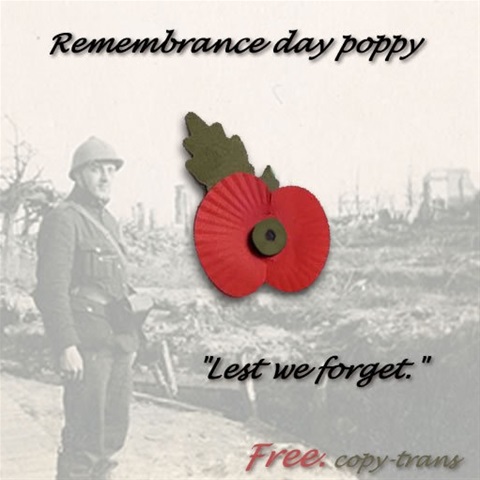
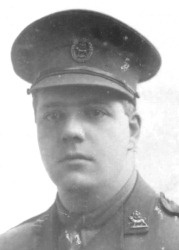
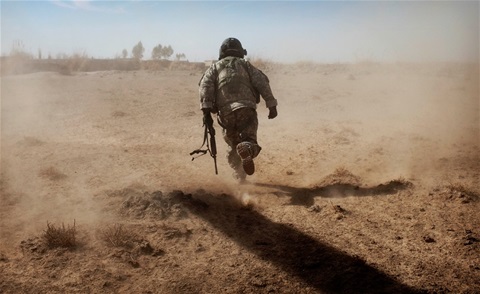
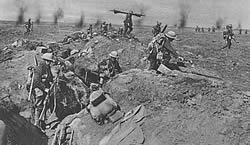
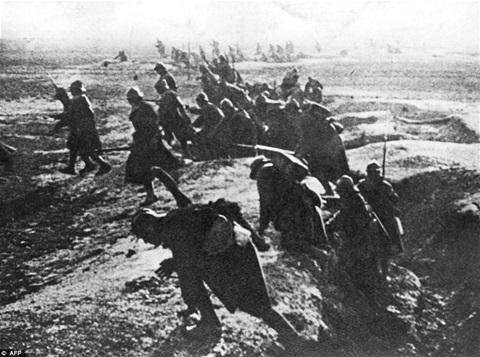
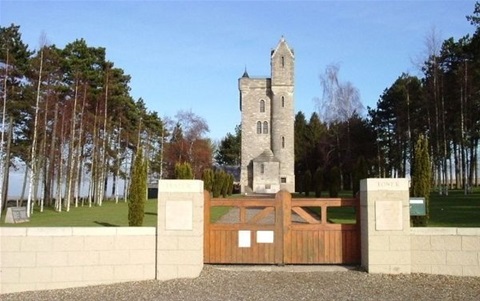
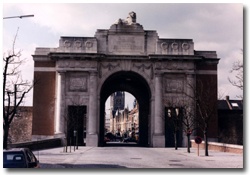
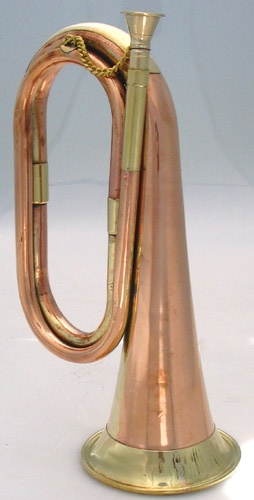
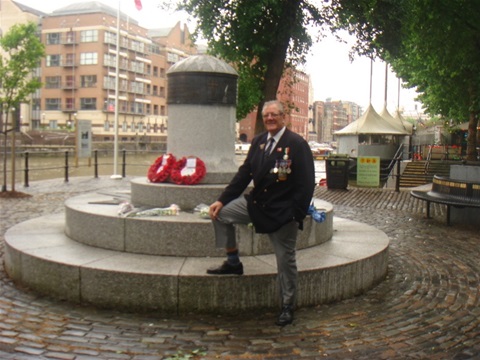
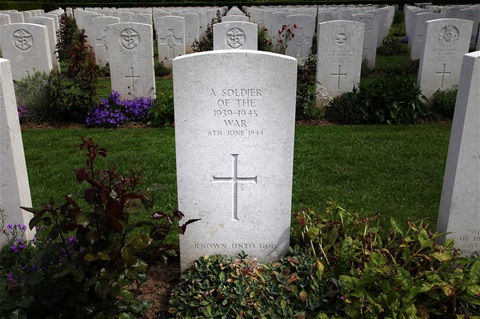
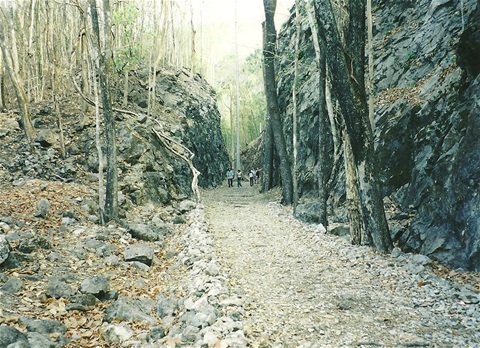
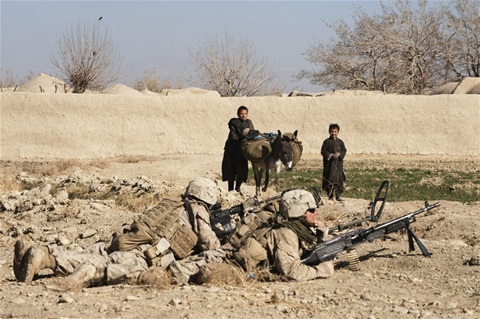
Latest comments
Thanks Jacqui - I have sent away for your book - `an looking forward to reading it - Cheers Joe x
I've started reading your book, Joe. It's made me smile, laugh and understand. My father and grandfather, merchant seamen of their time, are long gone but they would have loved your book.
Nice photo guys
I regret I cannot remember that particular name - sorry - cheers Joe